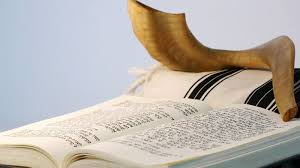Celebrating Jewish Fall Holidays

A shofar, ram’s horn, a siddur, prayer book and a tallit, a religious covering worn traditionally by men after their bar mitzvah, are used on the Jewish holiday Rosh HaShannah. Photo By: the Palm Beach Post
On Sept. 21, Jewish people all across the world celebrated the new year of the Hebrew calendar, Rosh Ha’Shanah, and on Sept. 30, Jews fasted for 26 hours for their day of repentance, Yom Kippur.
The Hebrew calendar is based on the lunar cycle, based on the moon’s phases. On Rosh Ha’Shanah, Jews have a big feast on the eve of the holiday. Traditional foods eaten include apples dipped in honey to wish a sweet new year, the head of a fish to represent the want to always move forwards, a round challah (egg bread) to represent how the year is round and a continuous cycle and the seeds of a pomegranate because the average pomegranate has the same number of seeds as there are mitzvahs (good deeds) in the Torah (the five books of Moses). Jews also refrain from working, including pressing elevator buttons writing, driving and using electronics.
“I love Rosh Ha’Shannah because all the special food we eat is really good, and it is a happy holiday where I get to see my family,” said sophomore Maya Milstein.
Yom Kippur is the Jewish Day of Atonement and it is the holiest day in the Jewish calendar. Yom Kippur is a major fast day for the Jewish people, meaning the fast (a period of time where they cannot eat or drink anything, including water) lasts for about 26 hours and it is done to atone for their mistakes over the past year.
There are exceptions to who must participate in the fast, women who are pregnant and children under the age of nine are not permitted to fast. Also, medicine is allowed to be taken and fasting is not required of it threatens one’s health.
On Yom Kippur, Jews attend synagogue (a building of warship for the Jewish people) three times: on the eve of the holiday, in the morning of the holiday, and at night. It is traditional to have a big feast on erev (eve) Yom Kippur and to wear white, to symbolize purity, when one attends synagouge. On Yom Kippur, Jews also refrain from working, wearing leather, driving, showering, putting on lotion or perfume and using electronics.
“[Yom Kippur] is a time of forgiveness and apologizing for our wrongdoings. I apologize, forgive and fast,” said junior Roni Kassil.










